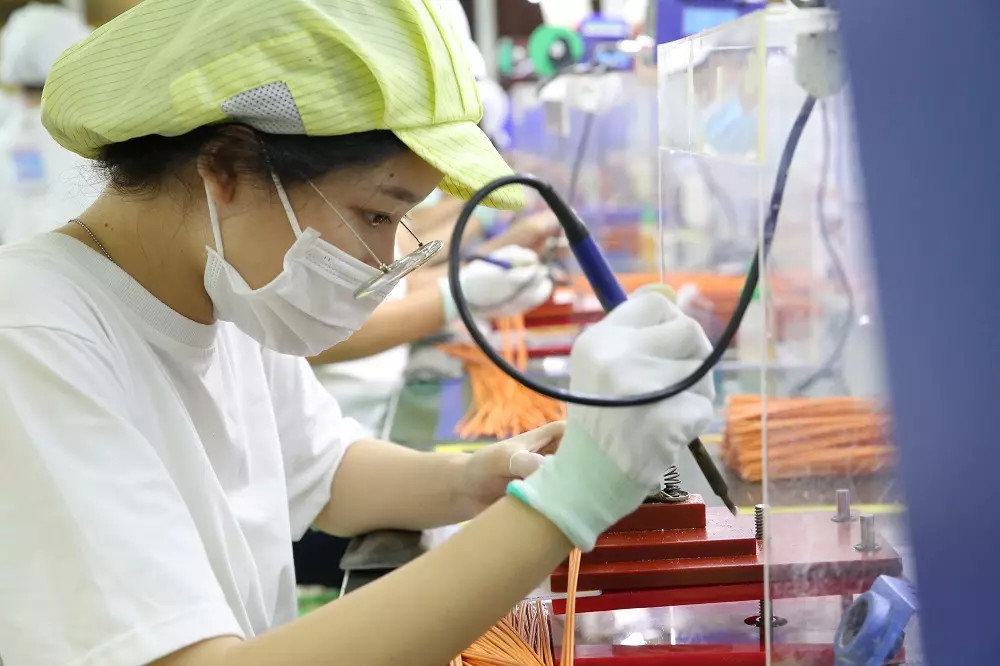
The cargo output of International Logistics Corporation (InterLOG) increased by 23 percent so far this year in comparison with the same period last year.
According to Tran Thanh Hoa, deputy business director of InterLOG, the company’s operation has been recovering well. As fuel prices are on the rise, logistics firms have had to optimize their operation and expenses to provide services at competitive prices.
As the partner of many foreign invested enterprises (FIEs) nationwide, Vietnam is considered an attractive destination and it needs to grasp the opportunity to lure more investors and become a reliable place for foreign investors.
The Business Climate Index (BCI) announced by EuroCham in Vietnam on July 4 showed that the European enterprises’ confidence in Vietnam’s business environment in Q2 decreased slightly compared with Q1 by 4.4 percentage point to 68.8 points.
The prolonged war in Ukraine, the sharp rise in goods prices and the ripple effects of the Chinese ‘Zero Covid policy all have led to lower expectations of European businesses in Vietnam.
Compared with Q1 2022, the confidence in Vietnam’s growth potential has decreased. Sixty percent of surveyed predicted that Vietnam’s economy would be stable or improve in Q3. The figure was 69 percent in Q2.
Nguyen Duc Kien, head of the Prime Minister’s Economic Advisory Board, said at a workshop held recently by the HCM City Economics University that new factors have appeared since the beginning of the year, causing the world to fall into a state of volatility, uncertainty, complexity and ambiguity, hindering socio-economic recovery.
He said that increasing geopolitical tensions have changed basic economic values established after World War II, especially the deep globalization trend in the past 30 years. This situation has hampered global efforts to tackle issues like the Covid-19 pandemic, poverty, inequality, climate change and environmental pollution.
The inequalities in the post-pandemic economic recovery have become apparent as many emerging and developing economies will face more difficulties due to the indirect impact from the Russia-Ukraine military conflict.
Barriers
To collect information for BCI, EuroCham asked more than 1,200 its members in most of the business fields of Vietnam to provide quarterly updates about their business and predictions for their performance in Vietnam.
The survey pointed out that there are barriers to European investments in Vietnam and trade of the two sides. Thirty-five percent of surveyed people said simplifying administrative procedures is the most effective way to increase FDI capital, while 24 percent said developing infrastructure is the major factor.
Forty-five surveyed people said the major difficulties that foreign companies have are related to administrative procedures. The complicated procedures hinder the ability to take full advantage of the EU-Vietnam Free Trade Agreement (EVFTA).
Commenting about BCI results in Q2 2022, EuroCham Chair Alain Cany said the confidence of European businesses has decreased slightly, but all the factors affecting Vietnam are outside the country. A number of factors outside are causing global economic uncertainties.
Meanwhile, 45 percent of those surveyed said they feel very satisfied, or satisfied about Vietnam’s great efforts to attract and retain FDI. Seventy-six percent hope their companies will increase the investments in Vietnam before the end of Q3. About 55 percent of people think that Vietnam has improved its ability to attract and maintain FDI capital since Q1 2022. The BCI of Q2 2022 is still 7.6 percentage points higher than in Q4 2021 (61 points).
The report on FDI in H1 released by the Foreign Investment Agency (FIA) under the Ministry of Planning and Investment (MPI) showed that as of June 20, the total registered FDI capital was $14.03 billion, equal to 91.1 percent in the same period last year.
While the newly registered capital still has not fully recovered after the pandemic, the additional investment capital of projects in Vietnam and the capital contribution to buy into Vietnamese enterprises rose sharply by 65.6 percent and 41.4 percent, respectively. The implemented capital of FDI projects was $10.06 billion, up by 8.9 percent over the same period last year.
YouGov Vietnam Managing Director Thue Quist Thomasen commented that foreign investors’ confidence in the Vietnamese market is still stable amid uncertainties in the world, and FDI is still flowing to Vietnam.
Tran Chung